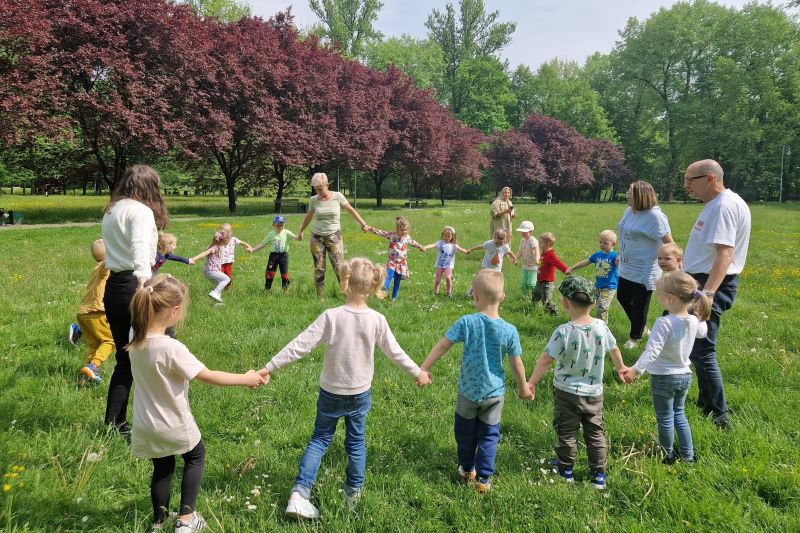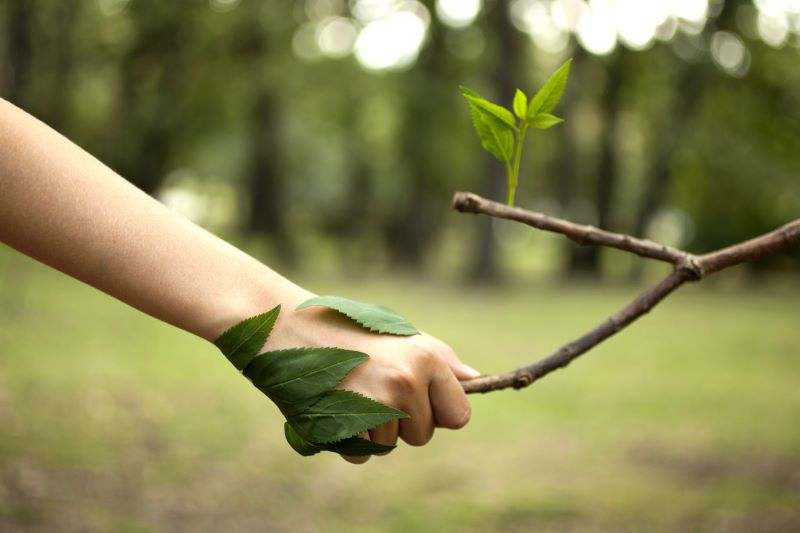Anthropogenic climate change is a fact confirmed by subsequent research conducted all over the world. Meanwhile, Polish schools usually do not include information on this topic in their education programmes even though the students often express such a need.
Contact
Magdalena Ochwat, PhD from the Institute of Computer Science of the University of Silesia – magdalena.ochwat@us.edu.pl
Prof. Piotr Skubała from the Institute of Biology, Biotechnology and Environmental Protection of the University of Silesia – piotr.skubala@us.edu.pl
We use the ideas of Glenn Albrecht, a transdisciplinary environmental philosopher, who in 2011 postulated the creation of a new conceptual framework for a new era, which he called the ‘Symbiocene’. He presented it in the book Earth Emotions. New Words for a New World.
| Adam Bała |
The sixth great extinction, biological annihilation, eco-apocalypse, armageddon – these are just some of the terms we are likely to hear from climate scientists when asked about the ongoing climate changes.
Narratives and stories are powerful – they affect imagination, evoke emotions, and encourage action. Magdalena Ochwat, PhD, from the Institute of Polish Studies of the University of Silesia and Prof. Piotr Skubała from the Institute of Biology, Biotechnology and Environmental Protection of the University of Silesia talk about the effectiveness of environmental education based on the humanities and natural sciences.
Photo by Magdalena Ochwat
Living on credit
Merciless data confirm that we need to take seriously all those grim scientific prognoses regarding the future of our planet.
‘According to the concept of ecological footprint, which defines the level of pressure humans exert on the biosphere, we are currently using 175% of the planet’s resources, i.e. 3/4 more than is being created’, says Prof. Piotr Skubała.
Another strong term is Earth Overshoot Day or, in other words, Ecological Debt Day. This is the date by which humanity has used its annual resources (soil, fossil fuels, forests, water, etc.) to produce all kinds of goods and exceeded the planet’s ability to replace them. In 2023 it was 2 August, whereas in Poland it fell much earlier, on 2 May. In 2009, when the concept of planetary boundaries, defining a safe space for our activities, was first presented, three out of nine safety thresholds had been exceeded; by now we have exceeded six of them. Currently, species are going extinct at a rate thousands of times higher than the natural rate. ‘Climate change is said to be only gaining momentum’, explains the biologist.
Voice of the young
Magdalena Ochwat, PhD is certain that the European Green Deal will only be possible if the right education policy is launched and a profound social transformation takes place.
‘Schools need to teach about what is happening to our planet and reflect critically on the ways in which Homo sapiens has been inhabiting it based on destruction extraction, and exploitation’, she argues.
The degradation of the environment will not leave the morality, sensitivity, and imagination of the youngest generation unaffected, and we will all feel its consequences. Therefore, schools have the duty to prepare students for the inevitable.
‘Education on the climate crisis should be a core element of the curricula for all courses’, argues Magdalena Ochwat, PhD.
The scientist also points to the increasingly vocal needs of younger generations demanding that up-to-date climate and environmental knowledge should be made available to them.
‘Environmental education and climate education are essentially about the same thing’, explains Prof. Skubała. ‘They both show us the possible ways out, pointing out the need to care for the Earth, nature, animals, plants, and people. When we talk about climate education, we are as much concerned with the climate as with the environment, biodiversity, and nature in all its richness. Climate and nature cannot be treated as separate issues’.
Cold shower
‘Are pupils in Polish schools aware of the crisis? How much time is devoted to it? Does the school teach about the causes? Does it focus on our responsibility for the fate of the endangered Earth? Are children, teachers and young people looking together for ways out of this situation? Does the Polish school teach students about what each of us, our families, the state, and humanity as a whole should immediately change if we want to preserve the world as we know it? Is school education centred around the knowledge of dependencies?’, asks Prof. Piotr Skubała.
The answer to each of these questions is a resounding no.
‘Information on climate and environmental education hardly appears in the core curriculum of school courses’, points out Magdalena Ochwat, PhD. ‘And if it does, it is scattered, selective, and present only in extended curricula’. Prof. Skubała is critical of Polish textbooks, but not due to the lack of care:
‘There is little information there about anthropogenic emissions and greenhouse gases. Words such as global warming, climate change, and biodiversity crisis are avoided’, he points out.
According to a 2021 survey carried out on 2,181 students by the Interdisciplinary Centre for Research on Education of the University of Silesia, nearly 60% found climate education to be unsatisfactory. Only 37.65% of students indicated that climate change issues are addressed in their schools.
Prof. Skubała presents New Zealand as a leader in climate education. In this country, climate neutrality is to be achieved by 2050. Based on the correct assumption that positive practices should be instilled in society from an early age, a programme has been launched there to encourage students to make pro-environmental choices. Since 2020, New Zealand’s youth has been taught in schools what the climate crisis is all about, as well as what activism and environmental fear look like.
Another example is Italy, which introduced compulsory classes on climate change awareness in schools. In addition to separate classes that will take place once a week, the Italian Ministry of Education also announced the introduction of elements of sustainability into such courses as biology, geography, and physics. ‘The Polish school system needs a holistic approach to climate and environmental education’, argues Magdalena Ochwat, PhD. ‘People tasked with education reform in Poland should listen to the voices of young people and take their expectations and recommendations into account when developing new core curricula’. Prof. Skubała points to the need to present life as a set of dependencies. A teacher should be willing and able to explain to their pupils what the inextricable threads connecting all elements of earthly existence are.
The primary goal of education should be to make the pupils feel that they are part of the great web of life’, he says. ‘Only by creating a deep, emotional connection with nature can a young person appreciate its inherent value and take environmentally conscious action’.
One of the most important terms that appear in climate education thought is Symbiocene, or the awareness of being connected to everything that surrounds us. Symbiocene is to provide us with a conceptual framework for the coming era. The Polish school system needs to introduce terms such as climate crisis and biodiversity crisis into the core curriculum. Climate education is supposed to lead to a shift in our consciousness towards a biocentric, ecocentric, and symbiotic awareness and a sense of community with other people and nature.
Photo by nikilitov – Fotolia
Climate education
Magdalena Ochwat, PhD and Prof. Skubała included their suggestions for climate education within the project ‘Geologos. Humanities in the time of the Anthropocene’ funded by the Excellent Science programme of the Ministry of Education and Science.
Among them were such recommendations as the introduction of climate and environmental education at all stages and levels of education and in every course, including academic education, changes to teacher training in all areas of knowledge, changes to the methodology in favour of field-based, engaging education, future-oriented education, the interdisciplinary nature of the environmental content presented, a return to cross-curricular paths in schools and, within academic education, consideration of the interweaving of disciplines, an appreciation of regionality (indigenousness, locality, and territoriality) and the perception of pro-environmental behaviour as civic and patriotic. An interesting proposal is the introduction of Fridays free from indoor classes in favour of project and field work.
Catastrophe of imagination
Magdalena Ochwat, PhD argues that the lack of faith in the potential of the humanities was a significant mistake made in the previous attempts at environmental education. The primacy of the natural and exact sciences over narratives that influence the way we perceive the world made environmental awareness ineffective. The neglect of imagination exercises, operating only with numbers and diagrams led us to the point where even when presented with the knowledge of the dire situation of our planet, we are still unable to believe it.
Prof. Lawrence Buell, an American literary scholar and founder of ecocriticism, warned us more than 30 years ago that the environmental crisis is a product of the crisis of imagination. Today, as the researcher notes, we are facing a catastrophe of imagination. Abstract curves and diagrams should be replaced by stories – this is the only way to open up young people’s imagination. It is unlikely that empathy for anything or anyone will develop without it.
A ray of hope – the climate in Katowice
At the beginning of 2024, the Katowice climate education programme was launched as part of the European City of Science Katowice 2024 (ECSK 2024) celebrations. It was developed in cooperation with the Open University at the University of Silesia and with the support of UNICEF. Magdalena Ochwat, PhD and Prof. Piotr Skubała are members of the Team for the Development of a Pilot Curriculum for Climate Education, which was established back in 2022 and is being implemented in self-government schools in Katowice.
The initiative developed four guiding areas of the original climate programme for Katowice, namely criticism of consumerism, loss of biodiversity, anthropogenic climate change, and energy transition. The programme was complemented by practical activities for teachers, including nature workshops and field activities (e.g. forest bathing).
As far as Polish self-government schools are concerned, this is a novel programme, whose uniqueness lies in the integration of climate change content into the core curriculum of all courses at the second education stage (in 7th grade of primary school). It is intended to facilitate the formation of pro-environmental attitudes and environmental awareness in young people. The classes will be interactive and interdisciplinary and will aim to engage students in discussion and motivate teachers to teach with passion.
The article entitled ‘Towards symbiocene. The future of climate education in Poland’ was published in No Limits no 1(9)/2024, a popular science journal of the University of Katowice.







